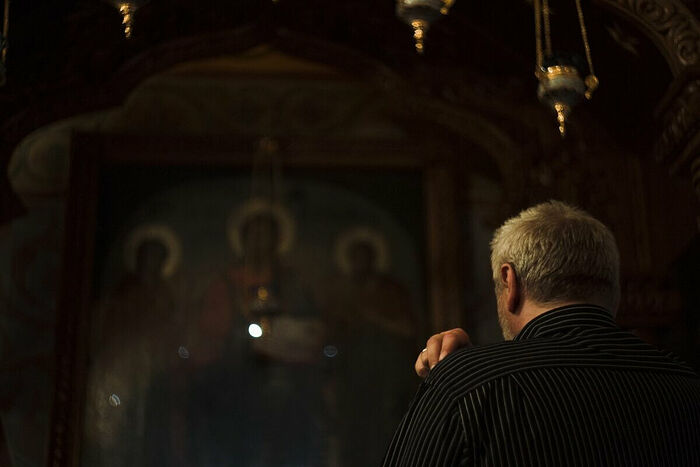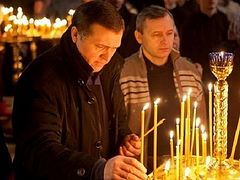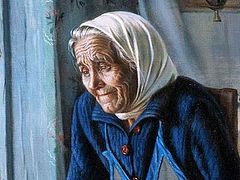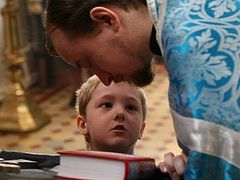How can we pray to convert a man to God? Especially your own child… We asked Hieroschemamonk Valentin (Gurevich), the father-confessor of Moscow’s Donskoy Monastery, to answer this question.
We have to understand that it’s not we who bring a man to the Church, but the Lord. And He Himself knows better than us when it’s the best time to do it.
Here’s a story that happened to me. It was still under Soviet rule. I somehow managed to find the right words for people then so they would come to believe and come to the Church. But one man who was especially dear to me for some reason always resisted. One day I found very clear words that were impossible to argue with, but this man couldn’t take it anymore: “Why are you pressuring me so much?! You’ve said your word, you sowed it in me, now it must ripen and grow. Now leave me alone! But instead, you’re so forceful…” It was a cry from his heart. Right after that, in the evening, I went to church with one of our parishioners. I was feeling bad, and I told him about my sorrow, to which he replied that he had read C. S. Lewis’ Screwtape Letters, about the correspondence between two demons. The older demon writes to the younger one about Christ that He’s incomprehensible to him. Christ says He loves man, but leaves him free. For the demon, love is holding a loved one tightly in its claws.
And the next day at Liturgy, Fr. Valerian Krechetov delivered a sermon on how different peoples embraced Christianity in different ways. In some places it was like a flooding sea, where everyone immediately accepted Christ’s teaching; in other places it was like a river, where a community of the faithful was formed; and in other places it was like underground water, where someone secretly came to believe in Christ. This is probably what happened in Rus’ after the preaching of the holy Apostle Andrew the First-Called. The Apostle’s preaching couldn’t not have left a trace, with some communities and disciples appearing; and the bloodless Baptism of Rus’ under Prince Vladimir almost 1,000 years later was apparently the result of the effect of this Gospel leaven mystically assimilated in our lands in the first centuries of Christianity. Likewise, every man is like an ethnic group: Some accept the word of God right away, and some gradually. If we have succeeded, we have only slightly loosened the soil and sowed the word. Whether or not it will grow isn’t up to us. Perhaps this word won’t yield fruit until towards the end of a man’s life. The Lord knows what time is the most saving for each soul. One man can be a Christian from childhood, but the Lord knows that it’s better for someone else to come to believe in old age and be saved, because perhaps there will be persecution during his life and he’ll renounce Christ. We shouldn’t put pressure on anyone—our only duty is to bear witness. Man is free. We speak the word, and the fruit that it can bear in due time is then God’s work. I saw how a man came to believe on his deathbed, although he had denied faith in Christ all his life.
But as for children, I’ve heard the following story that took place during World War II. A special train with recruits was running. They weren’t even dressed in military uniforms yet. The train arrived at its destination, which was already behind the front line, because the Germans were advancing very quickly. The recruits fell into the hands of the enemy. They were lined up on a platform, and one group was separated out and forced to dig a pit. Then the “diggers” were shot, and the others were brought to the pit in groups and shot with machine guns. Young people, aged eighteen to twenty were killed. All of them were Komsomol members, atheists and blasphemers of that time. They really wanted to live—they knelt down, shedding tears and stretching out their trembling hands to their executioners, begging for mercy.
Among them was a young man, also a Komsomol member, a blasphemer, etc. But all this shocked him so deeply that the thought occurred to him: “I can’t expect help from people—only God can help me.” He remembered how, when he was a child, his mother used to pray in front of her Kazan Icon of the Mother of God, while an icon lamp was burning, and he, still an infant then, participated in her state of prayer—it was familiar to him. He began to pray and got so immersed in prayer that he no longer perceived the outside world; he didn’t see anything and didn’t hear the gun fire. Only after some time did he feel someone pushing him on the shoulder. He saw a German officer in front of him who told him: “Go to that house! The general has just arrived and you’ll serve there.” This young man was the only one from the entire train to survive. Perhaps he was the only one who remembered God. Then he ended up in the Buchenwald concentration camp, but survived there too. He returned to the USSR and lived to a ripe old age. I once wrote the short story, Reliable Straw, based on his account.
Then I immediately stumbled across a pre-revolutionary book without any beginning or end. But it was clear that the author had been engaged in spiritualism, headed this then-popular movement, and even published the “Spiritualist” magazine. He began to have problems with his nervous system, and someone advised him to go to Optina Monastery. He went to see the holy Elder Nektary of Optina, and no sooner had he crossed the threshold of his cell than the saint, without being informed about his guest, immediately started talking about spiritualism. This really startled our spiritualist. He realized that there are demonic tricks, and there are true Gospel miracles that facilitate the salvation of the human soul. The former spiritualist changed radically, repented, and began to travel around Russia lecturing against spiritualism and in defense of the truth of Orthodoxy. This book that I found was just a collection his lectures. He writes there, apparently partly retelling the instructions of the Optina Elders, for example, that parents should pray in the presence of their children starting from infancy so they can join in the state of prayer. If they gain such experience in infancy, then when they come of age and have other, earthly interests, even if they forget God and fall into a bad crowd of atheists who have renounced religion, God, Christ, and everything, all is not lost. For if such a man later finds himself in a situation with no way out by human means, he’ll remember his childhood state of prayer and apply it in this situation, clutching at God as at a straw, and the Lord will surely come to his aid.
And so, since the man in question, who turned out to be a recruit in German captivity, hails from Kaluga, perhaps his mother, who taught him prayer, had visited the same Optina Elders1 and listened to their same instructions. And that's the way it literally happened, according to their word.
Just don’t abandon Divine prayer. You will save yourself and your children.





